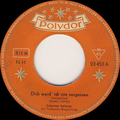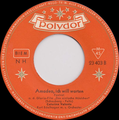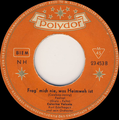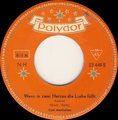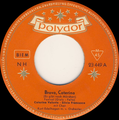The simple girl
| Movie | |
|---|---|
| Original title | The simple girl |
| Country of production | Federal Republic of Germany |
| original language | German |
| Publishing year | 1957 |
| length | 94 minutes |
| Age rating | FSK 12 |
| Rod | |
| Director | Werner Jacobs |
| script |
Curth Flatow , Eckart Hachfeld |
| production |
Artur Brauner for CCC-Film |
| music | Heinz Gietz |
| camera | Friedl Behn-Grund |
| cut | Jutta Hering |
| occupation | |
| |
The simple girl is a German hit film by Werner Jacobs from 1957.
action
The young Caterina Bastiani got a small supporting role in the film Endstation Liebe a few years ago , but she did not make her breakthrough in the film business. Now she works with her friend Milli and her brother Pit in a gymnastics school. One day she auditioned for the role of a dancer suggested by film star Robert Holden. Caterina convinces those responsible who reschedule: She is now given the main role in the film. This is based on a novel by the writer Thomas Krauss, who is widowed with his little son Jürgen and lives at Tanneck Castle in Unterkirchen. When he hears that his novel has been rewritten as an entertainment film with music, he is outraged. He believes that the main character, laid out as a simple girl in the novel, becomes a superficial singer through the actress Caterina. Although he has never seen Caterina before, he believes she cannot act and refuses to agree to the cast. Caterina travels with Milli to Unterkirchen to change Thomas's mind. However, he refuses a meeting by phone.
In the inn where Caterina and Milli stay, Eva Krapke is saying goodbye, who is about to start her job as a maid at Tanneck Castle that day. Without further ado, Caterina swaps roles with Eva and appears as the housemaid Eva at the castle. She has already learned at the inn that the housekeeper, Frau Seidel, disgusts every maid out of the house after a short time, as she is speculating on a marriage with Thomas. After a short time, Caterina sees the rumors confirmed. She only noticed shortly before the castle that she was still wearing her jewelry and stowed it in a coat pocket. The jewelry falls out of her bag in her maid's room and Frau Seidel immediately believes that Caterina stole it. In fact, their research reveals that Caterina, who now calls herself Eva, was always fired for theft from her previous employment. Mrs Seidel wants to fire her immediately, but Caterina has already made friends with Thomas' son Jürgen. He is committed to her whereabouts and Thomas also wants to give Caterina a second chance.
Robert's friend, the painter Werner Pätzold, also lives at the castle. In the village he meets Milli whom he secretly drew while bathing. Both get very drunk and fall a little in love. Thomas wants to make Caterina a better person and asks her about "stolen" jewelry. Caterina claims that it belonged to Baroness Westhoff, for whom Eva once worked. When Thomas and Caterina want to bring the jewelry back to the baroness, Milli steps in as the baroness. Now Werner also believes that he has fallen in love with a baroness. He gives up on her, but in the end decides to fight for her. Caterina in turn falls in love with Thomas. She knows that he would never forgive her for the dizziness and is now doing everything possible not to give herself away. When producer Anton Schwarz visits Thomas personally to convince him of Caterina, Caterina causes chaos so that neither photos nor recordings get into Thomas' possession. In the confusion, Anton forgets his watch in the castle room, which Frau Seidel is supposed to fetch for Anton. However, she puts the watch in her pocket, while Jürgen is watching it. A little later the clock is hidden in Caterina's room and Thomas thinks she stole it. Only Jürgen can clear everything up and Thomas dismisses the jealous Mrs. Seidel without notice.
Thomas fell in love with Caterina and both want to go on a trip with Jürgen on Sunday. Anton, however, has organized an important matinee performance for Caterina in the Astor Palace and so she pretends to be a sick aunt and drives into town to perform. Thomas and Jürgen also go to the theater to bring Anton back the clock. This is where Thomas and Caterina meet and Thomas is confused. He angrily agrees that Caterina is playing the role in the film, but never wants to see her again. Caterina is sad and can hardly finish her performance because of sheer grief. The next day, outraged men storm Tanneck Castle to hold him responsible for making Caterina sad. Werner Pätzold also speaks to Thomas' conscience, especially since he has since learned that Milli is not a baroness and does not think that is bad. Thomas learns that Caterina has loved him for a long time and makes up with her. Both get married, Werner and Milli will become a couple and Eva and Pit will also get married.
production
The simple girl was filmed in Austria and in the CCC studios from May 1957. Matzen Castle in Reith, Tyrol, served as Tanneck Castle . The film premiered on August 23, 1957 in Thalia, Wiesbaden . On July 19, 1969, the film ran on DFF 1 for the first time on East German television .
The set design is by Emil Hasler and Paul Markwitz , the costumes were created by Maria Brauner . Richard Allan , John Schaper , Lee Delmar , Gerard Nel , Jan Borall and the Lucas Trio , Die Moonlights and Die Comediens sing and dance in the film . The Kurt Edelhagen orchestra and the RIAS dance orchestra play, the choreographies are by Billy Daniel .
Caterina Valente sings the following songs in the film:
- Tipitipitipso (music: Heinz Gietz , text: Kurt Feltz )
- I will never forget you (Music: Heinz Gietz, Text: Kurt Feltz)
- Amadeo, I want to wait (music: Robert Schauberg, text: Kurt Feltz)
- Never ask me what homesickness is (Cowboy-Jonny) (Music: Heinz Gietz, Text: Kurt Feltz)
- When love falls in two hearts (duet with Richard Allan ; on record with Silvio Francesco as Club Manhattan ) (music: Heinz Gietz, text: Kurt Feltz)
- Bravo, Caterina (There are still fairy tales) (duet with Richard Allan ; on record with Silvio Francesco ) (music: Heinz Gietz, text: Kurt Feltz)
criticism
The film sheets called A Simple Girl a "lively and enjoyable game ..." and stated that Caterina Valente "was rarely seen as restrained and yet tidy and relaxed".
For the film service it was a “musical game of confusion with conventional, sometimes amusing, sometimes lengthy entanglements”.
“The comedy slowly takes off until the host finally sings: 'I'll never forget you.' Conclusion: Funny (with a 50s purity guarantee), ”wrote Cinema .
Web links
- The simple girl in the Internet Movie Database (English)
- The simple girl at filmportal.de
Individual evidence
- ^ Review in the film sheets . Quoted from Manfred Hobsch: love, dance and 1000 hits . Schwarzkopf & Schwarzkopf, Berlin 1998, p. 140.
- ↑ The simple girl. In: Lexicon of International Films . Film service , accessed March 2, 2017 .
- ↑ See cinema.de



